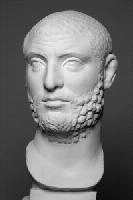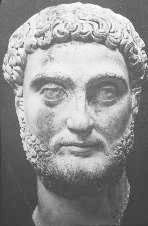
design & hosting
JERA-ICT B.V.
MENU
Home
Busts & Obverse Legends
Carinus Siscia antoniniani
Cyzicus Antoniniani.
Mints and mintmarks
Reverse Legends
The Career of Carinus
The CARUS Dynasty
Mints
Alexandria
Antioch
Cyzicus
Irregular-fakes
Lugdunum
plaats
Rome
Siscia
Ticinum
Tripolis
Emporer
Carinus
Carus
keizer
MagniaUrbica
Nigrinianus
Numerianus
Marcus Aurelius Carus  Born in 224 in Narona Illyria Died in July 283 in Ctesiphon in Mesopotamia Struck by lightning Augustus September 282 - July 283 Titles Parthicvs after his death Persicvs  Born in 249 (birthplace is unknown) Died in 285 on the banks of the Morawa river near Belgrade. Assassinated by a Tribune of his own army Caesar Oktober 282 - March 283 Augustus March 283 - May 285 Titles Princeps Ivventvtis as Caesar Consul 283 Germanicvs Maximvs 283 Persicvs Maximvs 283 Britannicvs Maximvs 284 Marcus Aurelius“ Numerius“ Numerianus  Born in 254 (birthplace is unknown) Died in September 284 near Nicomedia. Murdered by Praetorian Praefect Arrius Aper? Caesar December 282 - March 283 Augustus March 283 - September 284 Titles Princeps Ivventvtis as Caesar In the hot summer of AD 282 the emperor Probus was murdered by some soldiers at Sirmium. When calmness returned and order had been restored the repentant legions decided to elect their Praetorian Praefect as emperor in place of the unfortunate Probus. He was Marcus Aurelius Carus, a man of mixed background. He was born at Narbonne, Illyricum, and was both a Senator and a soldier, a most unusual combination during this period. In his youth he had received a learned education and his undoubted abilities had been signalised by advancement under successive emperors to the second highest office in the land. Now, at the age of sixty, he was to be emperor. Contemporary writers tended to be unenthusiastic about his personal qualities despite the success of his brief reign. His name was stigmatised with implication in the assassination of Probus however unlikely this may appear, especially in view of the savage punishment meted out to the murderers. One of his first acts was to confer the rank of Caesar on his two sons, the elder, Carinus, taking precedence over the younger, Numerian. Carinus was sent to secure Rome and put down a rising in Gaul while Carus and Numerian marched eastwards to begin the war with Persia which had been deferred since the death of the emperor Aurelian some seven years previously. The long march took many months and was interrupted en route to defeat an invasion by the Sarmatians and Quadi into Pannonia. It was not until mid-summer of the following year that the Roman army finally arrived at the borders of Persia. The Persian king, Varanes, alarmed at their approach sent his ambassadors to negotiate a peace.They found the army encamped for the evening and were ushered into the presence of a Roman soldier eating a simple meal with no indication of his rank save for the purple tunic of coarse wool that he was wearing. After they had spoken Carus replied that unless the Persian king immediately acknowledged the superiority of Rome he would "render their countryside of trees as his own head was destitute of hair". So saying he took off the cap he wore to show that he was quite bald. Carus was as good as his word. The Persians, distracted by internal strife and with the majority of their army guarding the frontier with India, were not able to offer much resistance. His armies ravaged Mesopotamia, captured Seleucia and Ctesiphon and soon reached the Tigris. It was here that tragedy occurred. One evening, in a violent storm, the emperor's tent was struck by lightening and the emperor himself found dead. At this the army, frightened by their superstitious beliefs, refused to advance any further and Numerian, powerless to do otherwise, was forced to retreat. Before crossing the Persian border Carus had wisely raised both his sons to the rank of Augustus. When he died their accession was therefore assured but since Carinus lacked the qualities his rapid rise to power demanded and Numerian's health had been undermined by the stay in Persia this situation could hardly be expected to last for long. The cruelties practiced by Carinus were likened to those of Domitian and his vices to those of Elagabalus. From the moment of his arrival in Rome he abandoned himself to a life of depravity. He is said to have married and divorced nine wives in the course of fcur months. Unworthy favourites were elevated to high office and the only item Roman historians could find to applaud were the magnificent, wasteful circuses he provided. At the head of his army Numerian retraced his footsteps. He became ill with opthalmia and preferred to remain in his tent by night and in an enclosed litter by day. Orders were relayed through his father-in-law, the Praetorian Praefect Arrius Aper, and gradually, as the army neared Heraclea in Thrace, a rumour began to circulate that Numerian was dead. Eventually it reached the ears of his bodyguard anu sure enough, when they broke into his tent, they discovered his corpse. Aper was immediately arrested and' charged 'with his murder. A military tribunal was convened and Aper pronounced guilty. The sentence of death was carried out by the commander of the bodyguard, Caius Aurelius Valerius Diocletianus, who was then hailed as emperor by the army. This news reached Carinus at the same time as news of another rebellion, this time in Pannonia, led by Marcus Aurelius Julianus, and an invasion of the northern frontiers by the Germani. But Carinus, for all his faults, was an able general and not lacking in personal courage. Relinquishing the opulence of Rome he marched against the Germani and defeated them heavily. Julian seized the opportunity thus created to march on Rome but he too was defeated and killed in a battle near Verona. This left only Diocletian to deal with. When the two armies met at Margus, in Moesia, Carinus was again victorious and Diocletian, for a moment, despaired of his life, but Carinus himself fell, murdered after the battle by a tribune whose wife he had seduced. With a single blow civil discord was extinguished and Diocletian became emperor of Rome. (text by Augustus Brown) |